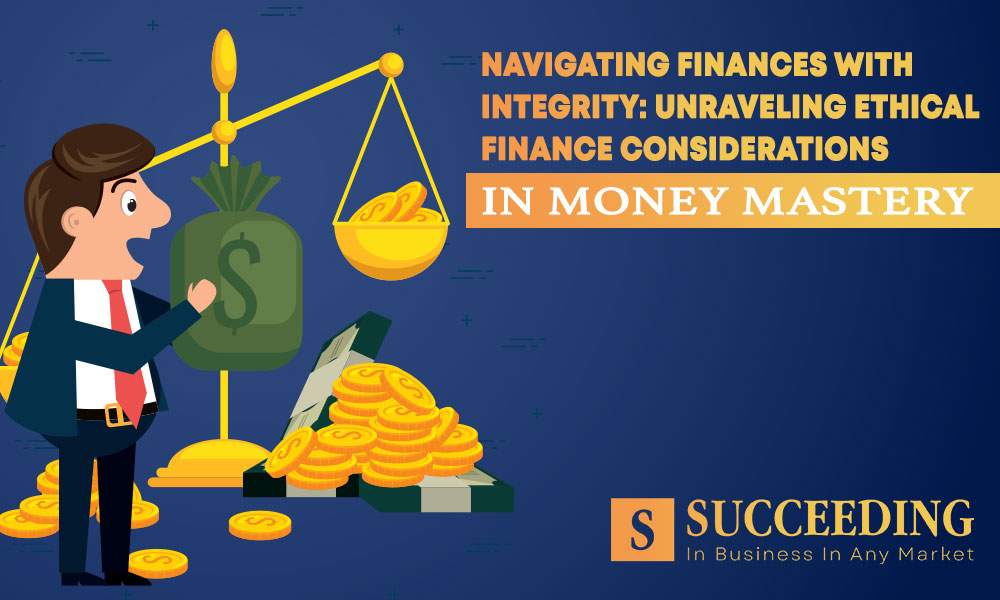Post Date: May 29, 2024

In a world driven by financial pursuits, the consideration of ethics in personal finance takes center stage. This article explores the crucial intersection of values and money, emphasizing the importance of ethical considerations in the pursuit of money mastery. Delving into the realm of “Ethical Finance,” we will unravel the principles guiding ethical financial decisions and their far-reaching impact on personal well-being.
1: Defining Ethical Finance
Ethical finance transcends profit motives, embodying a commitment to values, integrity, and sustainability. At its core, ethical finance seeks to align financial decisions with principles that extend beyond mere monetary gains. By considering the social and environmental implications of financial choices, individuals can contribute to a more equitable and responsible financial landscape.
2: Ethical Investing and Responsible Choices
Ethical investing empowers individuals to make financial choices that resonate with their values. Incorporating screening criteria such as environmental, social, and governance (ESG) factors, ethical investors prioritize companies committed to ethical practices. By aligning investments with personal values, individuals not only seek financial returns but also contribute to positive social and environmental outcomes.
3: The Impact of Spending Habits on Ethical Finance
Every purchase is a vote for the kind of world we want to live in. Ethical considerations in spending habits extend beyond personal satisfaction to the broader impact on industries and communities. Supporting businesses with ethical practices fosters a cycle of responsibility, encouraging ethical behavior throughout the supply chain. Conscious consumer choices can influence corporate practices and contribute to a more ethical marketplace.
4: Ethical Considerations in Debt Management
Ethical considerations play a crucial role in debt management. Fair lending practices, transparent terms, and responsible borrowing are essential components of ethical debt management. Acknowledging the impact of high-interest debt on financial well-being, individuals can adopt ethical debt repayment strategies that prioritize financial health and integrity.
5: Corporate Social Responsibility and Financial Institutions
Financial institutions play a pivotal role in promoting ethical finance through Corporate Social Responsibility (CSR). Choosing to engage with institutions committed to ethical banking practices ensures that financial activities contribute to positive social and environmental outcomes. Individuals can align with financial institutions that prioritize transparency, sustainability, and social impact.
6: Balancing Ethical Finance with Financial Goals
Balancing ethical considerations with financial goals requires thoughtful navigation. While financial objectives may drive decision-making, integrating ethical finance is not a compromise but a strategic commitment. Individuals can explore investment options, banking relationships, and spending habits that align with their values without sacrificing financial objectives. By striking this balance, money mastery becomes a holistic journey that prioritizes both ethical principles and financial aspirations.

Conclusion
As we navigate the intricate landscape of personal finance, the integration of ethical considerations emerges not only as a choice but as a guiding principle shaping our financial journey. Ethical finance is a compass that ensures our pursuit of money mastery is not only financially fruitful but also morally enriching. In embracing ethical principles, individuals contribute to a more sustainable and fulfilling financial ecosystem.
Reflect on your financial decisions through the lens of ethical considerations. Share your thoughts on ethical finance and consider how you can contribute to a more responsible and values-driven financial landscape.
FAQs:
Q1: How does ethical finance contribute to personal well-being?
A1: Ethical finance contributes to personal well-being by aligning financial decisions with one’s values. When individuals make choices that resonate with their ethical principles, it enhances a sense of purpose and fulfillment. Knowing that financial actions contribute to positive social and environmental outcomes fosters a deeper connection between personal well-being and financial choices.
Q2: Can ethical investing be financially rewarding?
A2: Yes, ethical investing can be financially rewarding. Increasingly, studies have shown that companies with strong ESG practices often outperform their counterparts in the long term. Ethical investing considers not only financial returns but also the sustainability and ethical practices of companies, providing a more holistic approach to investment that aligns with the values of many investors.
Q3: How can individuals promote ethical finance in their communities?
A3: Individuals can promote ethical finance in their communities by raising awareness about the impact of financial choices on social and environmental issues. Encourage conversations about ethical investing, responsible spending, and supporting businesses with ethical practices. By fostering a community dialogue around ethical finance, individuals can collectively contribute to a more conscious and responsible financial landscape.
Q4: What are some practical steps for balancing ethical considerations with financial goals?
A4: Balancing ethical considerations with financial goals involves practical steps such as researching and selecting investments based on ESG criteria, choosing financial institutions with transparent ethical practices, and being mindful of the social and environmental impact of spending habits. It’s about finding synergies where financial decisions align with personal values without compromising on financial objectives. Consulting with ethical financial advisors can also provide guidance in navigating this balance effectively.




